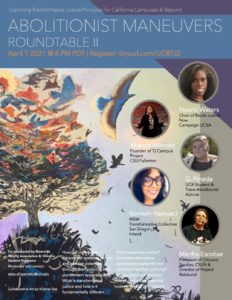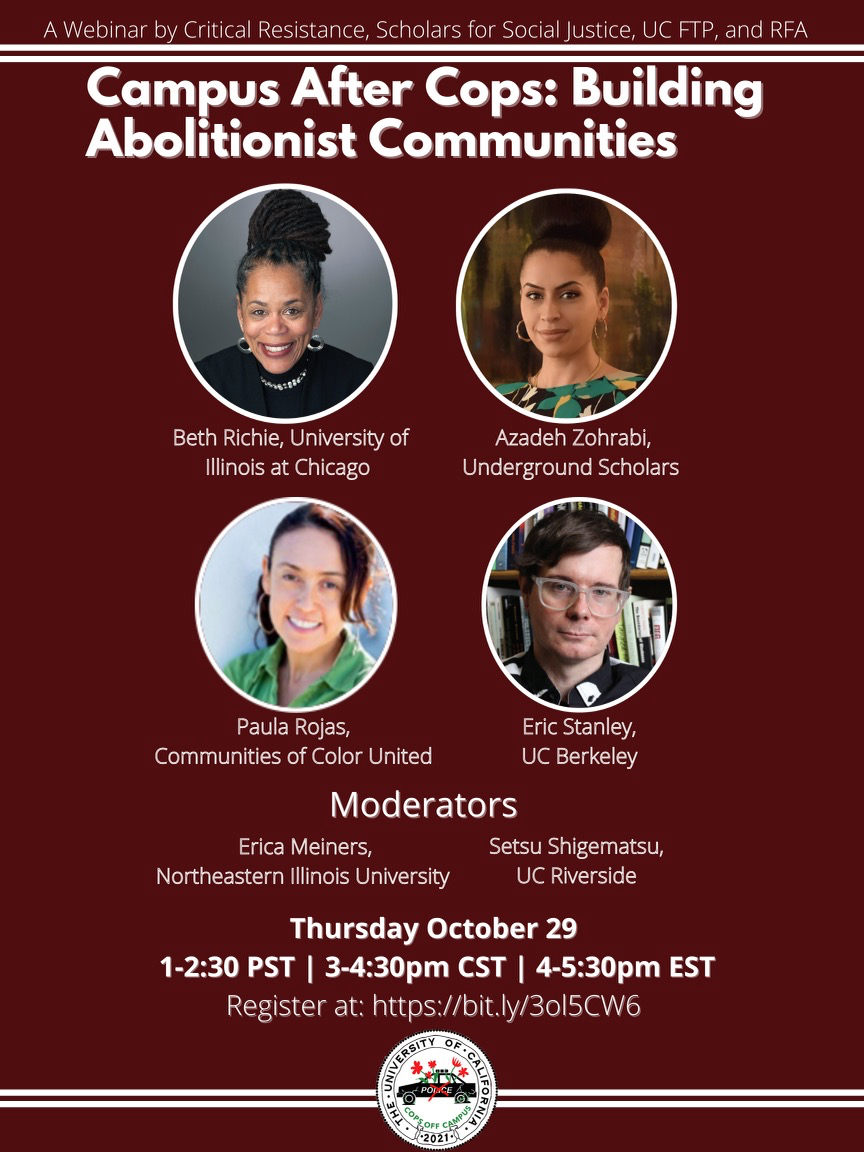January 12, 2021
by Admin 2
0 comments
To UCR Administration, Academic Senate Faculty, Staff Assembly and students
Re: Request to include faculty in the hiring of more UCRPD in 2021
Dear Colleagues,
On December 10, 2020, the Chair of the Riverside Division of the Academic Senate, Professor Jason Stajich, sent out a request for faculty to participate as part of a UCRPD police community interview panel. This request originated from a request by interim Police Chief John Freese to include non-UCRPD campus community members in the hiring process that was communicated to the Vice Chancellor of Planning, Budget & Administration Gerry Bomotti.
While we welcome greater transparency regarding the hiring practices and budget of UCRPD, the Board of the Riverside Faculty Association would like to remind the Administration and our colleagues that last June 2019, the UC Systemwide Academic Senate recommended substantial changes regarding UCPD.
The first two of these recommendations were:
- Substantially defund general campus police and redistribute those resources to the study and development of alternative modes of campus safety that minimize and/or abolish the reliance on policing and other criminalizing responses.
- Invest in resources that promote mental and physical well being of the campus community, specifically support services for Black students as well as for other marginalized student groups who have been historically targeted by police violence.
We are gravely concerned that the decision to continue to fund vacant UCRPD positions appears to disregard these recommendations by the UC Systemwide Academic Senate. Such a decision seems to bypass the looming cuts to vital instructional, research, and student support infrastructure (including staff) as a result of the COVID-19 pandemic. Rather than embracing this moment as an opportunity to consider a redistribution of precious university resources, the administration is designating policing as a default priority of this educational institution.
We are additionally disturbed by the fact the Chancellor’s Safety Task Force does not include faculty who are experts on policing and racial violence and thus we question its legitimacy. Moreover, we question its ability to be effective when the UCR administration is forging ahead with this UCRPD hire before the task force has had an opportunity to provide “advice on budget” and “recruitment of officers.” We also want to highlight the trauma that many Black students, staff, and faculty at UCR are experiencing in light of the domestic terrorist attacks on the Capitol last week; the violent display of white supremacy in those attacks;[1] the disparate use of force by law enforcement[2] in response to those attacks, compared with the largely peaceful Black Lives Matter protests last summer; and the long history of violent policing of Black lives. The inability and possible unwillingness of law enforcement to effectively respond[3] to this domestic terrorist attack illustrates the ineffectual nature of policing, calling into question the necessity of maintaining campus policing at its current levels. In light of the budget cuts due to the pandemic, nationwide demands to defund the police, and the urgency for investment in resources that promote mental and physical wellbeing of the campus community, we strongly urge the Administration to take the Academic Senate’s recommendations seriously and redistribute funds toward initiatives to address trauma and community-based approaches to campus safety and security.
We recommend that the UCR administration and community at large embark on a path towards Transformative Justice as an alternative to policing. Other UC campuses have already established centers or programs:
UC Davis: https://tje.ucdavis.edu/
Berkeley: http://rjcenterberkeley.org/
UC San Diego: https://www.sandiego.edu/soles/restorative-justice/
UCLA: https://law.ucla.edu/academics/centers/criminal-justice-program/criminal-justice-program-restorative-justice
UC Santa Cruz: https://ches.ucsc.edu/restorativejustice/index.html
UC Santa Barbara: http://studentconduct.sa.ucsb.edu/rj
We are co-sponsoring a series on Transformative Justice during Winter quarter 2021 and we invite the Chancellor, Provost, and VC of Planning and Budget Gerry Bomotti to attend this series.
Sincerely,
The Board of the Riverside Faculty Association:
Chris Chase-Dunn, Sociology
Farah Godrej, Political Science
Uma Jayakumar, Graduate School of Education
Quinn McFrederick, Entomology
Patricia Morton, Media and Cultural Studies
Helen Regan, Evolution, Ecology, and Organismal Biology
Ellen Reese, Sociology
Setsu Shigematsu, Media and Cultural Studies
Samantha Ying, Environmental Sciences
Home
[1]White Supremacy and Impunity Made Attack on Capitol Possible, https://foreignpolicy.com/2021/01/11/white-supremacy-capitol-assault-trump-supporters/
[2]https://www.cbsnews.com/news/blm-protests-us-capitol-siege-photos-difference-police-response
[3]https://www.npr.org/2021/01/11/955809557/two-capitol-police-officers-suspended-for-actions-during-rioters-attack-on-capit?sc=ipad&f=1001&fbclid=IwAR3hIJuHpelzHpxINWOxzv8BazPGzYjX7ugeA2OKldwmMTCQQnAtgR8cc8E





